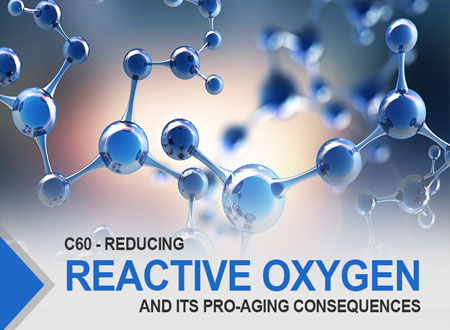

C60 can possibly drastically reduce Reactive oxygen species and its pro-aging consequences.
C60 might significantly reduce reactive oxygen species produced by leaky mitochondria and associated cell damage, but not by a direct antioxidant effect.
An important recent paper by David Sinclair and his associates describes how such ROS can be induced by age-related absence of sufficient NAD+ in the cell nucleus leading to a state of pseudohypoxia and insufficient expression of mitochondrially-coded protective genes

DNA damage triggers the DNA damage response which in turn triggers p53 activation which can then inhibit PGC-1b, resulting in the inhibition of gene transcription for nuclear-encoded mitochondrial proteins. This mechanism can induce high mitochondrial ROS generation, Warburg-type metabolism, increased oxidative stress leading to further negative effects such as more DNA damage.
DNA damage can then lead to PARP-1 activation, which then can deplete nuclear NAD+, which then will stop SIRT1, SIRT6, and SIRT7 function. This then leads to a pseudohypoxic state of the nucleus due to HIF-1a stabilization. This in turn leads to inadequate TFAM, which then results in inadequate expression of mitochondrially-encoded proteins for electron transport. Thus, mitochondrial dysfunction can be triggered by telomere-dependent, DDR-mediated activation of p53.
Liposomal encapsulated C60 fullerenes are not toxic and have an anti-cancer effect, whereas non-encapsulated C60 fullerenes do NOT have an anti-cancer effect.
The following publication suggests that another benefit of C60 could be an enhancement of mitophagy. If this applies, C-60 might have three different positive effects:
http://www.ncbi.nlm.nih.gov/m/pubmed/21173115/?i=4&from=/23620051/related
Watch Dr. Golding talk on Integrative and Anti-Aging Medicine.
Sign up for our newsletter to find out more about the exciting world of integrative medicine
